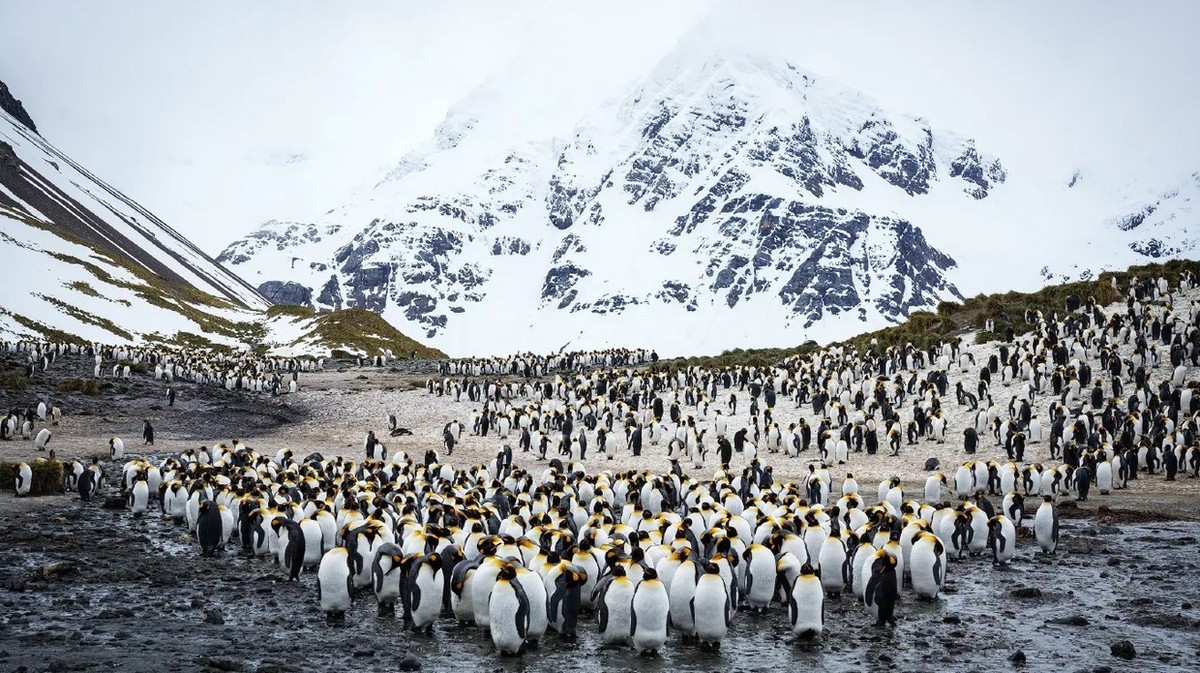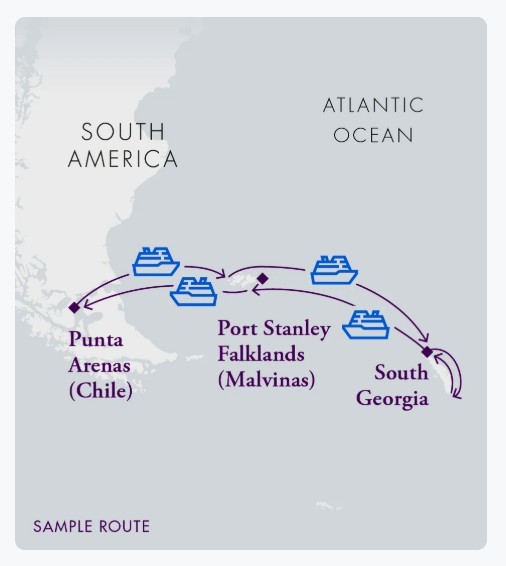
Set over 300 miles east of Patagonia, the Falkland Islands are in the heart of the South Atlantic Ocean. The islands host an impressive array of wildlife, from the world’s largest colony of Black-Browed albatrosses to three species of penguins not found in Antarctica: the golden-haired Rockhopper penguin, the black-banded Magellanic penguin, and the tangerine-cheeked King penguin. Although its proximity to Argentina suggests it was once part of South America, scientists believe the islands were once attached to the African continent. Consequently, this has lead to theories that the archipelago’s flora and fauna arrived through dispersal.
Home to a similar climate and topography as Tierra del Fuego, the archipelago’s two main islands, East Falkland and West Falkland, are the most commonly traversed. Although around 700 more rocky islands and islets make up the archipelago and cover a nearly 4,700 square-mile area.
With a long history of disputes over the land, the Falkland Islands are marked by times of war. France, Spain, and Argentina have all claimed the Falkland Islands at some point throughout history. However, since 1833 the United Kingdom claimed the archipelago as an overseas territory. On the other hand, today, around 3,200 settlers call the capital of Stanley in East Falkland home. Above all, the archipelago’s wildlife on land and sea truly set it apart. Creatures like the rare Striated caracara are often sighted circling above the area’s rocky coastline. Similarly, marine mammal species like Elephant seals, Fur seals, and Peale’s dolphins swim throughout the kelp forests of the icy South Atlantic waters.
- Diverse Penguin Species - Home to five penguin species including the Rockhopper and King penguins.
- Port Stanley - A charming seaside town that blends British heritage with stunning natural surroundings.
- Abundant Seabirds - A paradise for birdwatchers and wildlife enthusiasts.
Prices quoted here are often dependent on currency fluctuations. Please check with (01432 507450 or info@small-cruise-ships.com) for the very latest price, which may well be cheaper than the one advertised here.






Prices quoted here are often dependent on currency fluctuations. Please check with (01432 507450 or info@small-cruise-ships.com) for the very latest price, which may well be cheaper than the one advertised here.






From 10:00 hrs, make your way to Explorers House in Punta Arenas and enjoy the facilities. At 15:00 hrs, a group transfer will take you to the port for embarkation. As we sail along the Strait of Magellan, our Expedition Team will introduce the history of this fabled sea route.
Enjoy the ship’s amenities and on board program as we make our way to the Falklands (Malvinas). Our engaging series of lectures and presentations begins.
We enjoy the long white-sand beach during a morning visit to Saunders Island. A wilderness experience, the main attractions are rockhopper penguins, nesting black-browed albatross, and sub-Antarctic gentoo penguins. In the afternoon, we visit West Point Island. There is an option for an easy hike to a nesting black-browed albatross colony, bird watching, and a typical Falklands tea experience.
Join our expedition team on guided walking tours of Port Stanley. Or explore on your own and absorb the atmosphere, grabbing lunch at the local pub, visiting the maritime museum, the church, hunting for souvenirs, or walking down Ross Road, paying tribute at the war memorials at the waterfront.
As we sail towards South Georgia, attend presentations on the history and fauna of the archipelago. In the company of expert guides, watch for wildlife from the lounge or from the outside decks. You may spot magnificent seabirds, such as albatrosses and petrels, as well as different species of whales.
Depending on sea conditions over the previous days, arrival is planned for the afternoon. Provided we receive approval from the South Georgia government, we plan to do an evening Zodiac cruise at Elsehul Bay.
Our first landing could be at Grytviken. We clear Customs and then visit the historical site with the museum and Ernest Shackleton's grave. We land at Fortuna Bay / Stromness in the afternoon to see king penguins. Here, we learn more about Shackleton and his expedition, and there is also an optional 2-3 hour "Shackleton walk."
In the morning, we plan a landing at Gold Harbour, a spectacular location with king penguins, elephant seals, and hanging glaciers. There are also sooty albatrosses here. If weather allows, we ship cruise across the Dryglasky Fjord in the afternoon.
St Andrews Bay is the destination of our morning excursion. The highlights here are a shipwreck and the remains of the whaling industry. We see one of the world's largest king penguin colonies and elephant seal bulls. We plan a Zodiac cruise in the afternoon and landing at Ocean Harbour.
Depending on weather conditions, we plan to visit Salisbury Plain to observe more king penguins and stunning landscapes. After this morning activity, we start our way back to the Falkland Islands.
Our education program continues as we make our way back to the Falkland Islands (Islas Malvinas).
Evening landing at Bleaker Island, a natural reserve famous for its large variety of birds.
Upon arrival at Punta Arenas, we disembark and take a group transfer to the town center, where the expedition will end. Explorers House remains available to you for the day.
Itineraries are subject to change.
Magellan Explorer

| Length: | 91 metre |
|---|---|
| Built: | 2018 |
MV Magellan Explorer features 50 passenger suites and cabins in five categories of accommodation, including dedicated single cabins. The cabins are very spacious, ranging in size from 40 m2 (440 sq. ft.) to 20 m2 (220 sq. ft.). All double cabins have two twin beds that can be configured as one queen-size bed, offering great flexibility to our guests. 42 cabins feature a large window and a private balcony, while 8 cabins feature a porthole. All cabins feature a private bathroom and a sitting area.
Public areas include a large, forward-facing observation lounge, an observation deck, a dining room that accommodates all guests and expedition staff in a single sitting, two meeting rooms, a gift shop, a protected outdoor barbecue area, a gym, and a sauna. The bow of the ship is accessible to guests to offer expansive views during exploration. Optional adventure activities, such as kayaking and snowshoeing, are available.
Specific measures have been taken to minimize MV Magellan Explorer’s carbon footprint, including state-of-the-art engines that meet MARPOL’s stringent Tier III emission standards. To minimize fuel consumption, a waste heat recovery system recycles the heat produced by the ship’s engines and repurposes it to power the ship’s heating system and to warm the water used on board.


